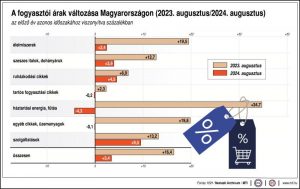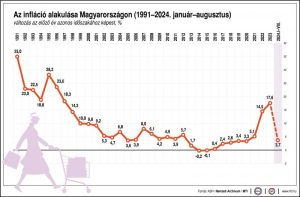
The government remains committed to a meaningful increase in the mandatory minimum wage.Continue reading

As in previous months, inflation remained at the low level expected by the market in August, Márton Nagy, Minister for National Economy, said in a statement. The annual inflation rate of 3.4 percent in August is a clear improvement on July, when inflation was 4.1 percent.
Although inflation in August 2024 was on average 3.4 percent higher than in the same month a year earlier, consumer prices were on average unchanged compared to July, the latest data release by the Hungarian Central Statistical Office (KSH) shows. The figures released on Tuesday also show that annual inflation this year has not been as low as in August.
Compared to August last year, food prices increased by 2.4 percent, including flour by 27.7 percent, chocolate and cocoa by 10.6 percent, restaurant meals by 8.0 percent, fruit and vegetable juice by 6.7 percent, edible oils by 5.5 percent, milk by 4.8 percent, non-alcoholic beverages by 4.4 percent and pork by 3.4 percent.

Change in consumer prices compared with the same period of the previous year, in percentage: food; spirits, tobacco; clothing; consumer durables; household energy; other articles, fuels; services; total. Source: MTI
In his statement, the minister recalled that
on an annual basis, the price of household energy fell by 4.3 percent, including 9.4 percent for piped gas, 1.7 percent for electricity and 2.9 percent for vehicle fuel.
On a month-on-month basis, food prices were on average unchanged compared to the previous month, but within food, eggs were 2.3 percent lower, dry pasta 1.7 percent lower, pork and sausages 1.4 percent lower, while seasonal food (potatoes, fresh vegetables, fresh domestic and tropical fruit in total) were 1.2 percent lower. All this could have a positive impact on consumption trends.

Inflation in Hungary (1991 – January-August 2024). Change in consumer prices compared to the same period of the previous year, in percentage. Source: MTI
The minister noted that
food price disinflation is being driven by a significant fall in farmgate prices. This foreshadows that prices in some food product paths could fall further in the coming months, further strengthening demand growth.
Assessing the data, he added that in order to keep inflation low, the government will continue to maintain targeted and effective measures such as the online price monitoring system, that has been contributing significantly to boosting retail competition and keeping inflation under control since July 1, 2023.
Márton Nagy pointed out that persistently low inflation means predictability and real wage growth thanks to high wage growth.
Via MTI, Featured image: Pexels